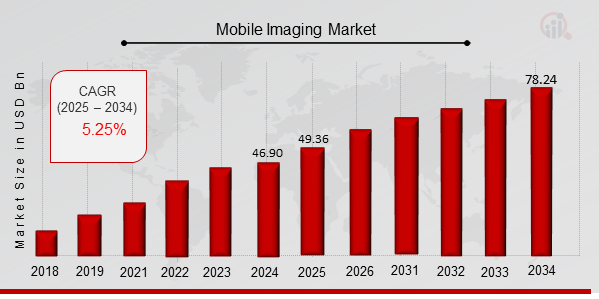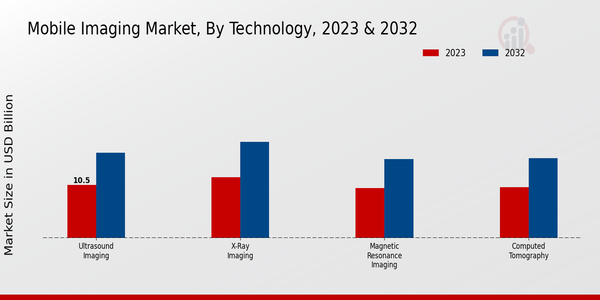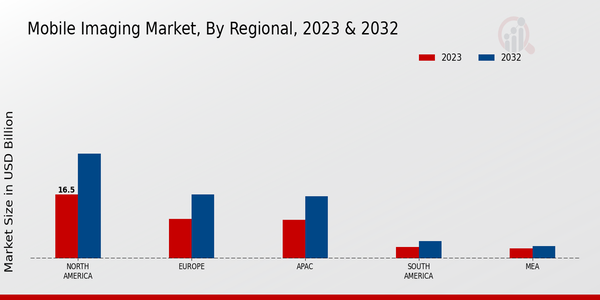Mobile Imaging Market Overview
As per MRFR analysis, the Mobile Imaging Market Size was estimated at 46.90 (USD Billion) in 2024. The Mobile Imaging Market Industry is expected to grow from 49.36 (USD Billion) in 2025 to 78.24 (USD Billion) till 2034, at a CAGR (growth rate) is expected to be around 5.25% during the forecast period (2025 - 2034).
Key Mobile Imaging Market Trends Highlighted
The Mobile Imaging Market is witnessing significant growth driven by various key factors. The increasing adoption of mobile imaging technology in healthcare and diagnostics is a major market driver. As healthcare providers seek to enhance patient care and streamline procedures, mobile imaging solutions are becoming essential for quick and accessible imaging. The growing demand for point-of-care imaging and remote diagnostics further emphasizes the need for mobile imaging systems. Additionally, advancements in technology, such as artificial intelligence integration and improved imaging quality, are shaping market dynamics, enabling rapid developments and enhancing user experience.
Various opportunities are available to be explored within the market. The expanded use of mobile imaging in regions with limited access to traditional imaging resources can contribute significantly to market growth.
There is potential for mobile imaging solutions in emerging markets where healthcare infrastructure is evolving. The integration of mobile imaging with telemedicine platforms also presents new avenues for service delivery and collaboration, thereby improving patient outcomes and access to care. The rise in home healthcare services provides additional chances for mobile imaging applications as more patients seek convenient options.Recent trends indicate a shift toward more portable and user-friendly imaging devices. The emphasis on minimizing patient exposure to radiation, alongside the development of non-invasive imaging techniques, is changing the landscape of mobile imaging technology.
Additionally, there is a growing trend toward connectivity and interoperability of mobile imaging systems with other healthcare IT solutions. This trend is fostering a more holistic approach to patient care, improving workflows, and enabling healthcare providers to make more informed decisions quickly. Overall, the Mobile Imaging Market is evolving, driven by technological advancements and changing healthcare needs that create a landscape ripe for innovation and growth.

Source: Primary Research, Secondary Research, Market Research Future Database and Analyst Review
Mobile Imaging Market Drivers
Technological Advancements in Imaging Technologies
Technological advancements are a significant driver in the Mobile Imaging Market Industry, revolutionizing the way imaging is conducted across various sectors, particularly in healthcare and diagnostics. Innovations such as enhanced imaging algorithms, artificial intelligence integration, and miniaturization of imaging systems are expanding the capabilities and functionalities of mobile imaging devices. As the demand for high-quality imaging increases, manufacturers are focusing on developing portable devices that can provide real-time imaging with superior resolution and accuracy. These devices are equipped with advanced features such as wireless connectivity, enabling seamless data transfer and remote monitoring.
Moreover, the rise of smartphone-based imaging, which utilizes high-resolution cameras alongside sophisticated software applications, is making mobile imaging more accessible.
As the technology continues to evolve, the cost-effectiveness associated with mobile imaging solutions is likely to attract more end-users, contributing to the industry's growth. Furthermore, the expanding applications of mobile imaging tools in telemedicine, emergency healthcare, and routine examinations underscore their essential role, influencing positive growth momentum in the market landscape. The growth potential in emerging markets, along with increased investments in research and development by key players, is also expected to boost the Mobile Imaging Market in the upcoming years.
Increase in Chronic Diseases and Healthcare Needs
The rising prevalence of chronic diseases ly is a major driver in the Mobile Imaging Market Industry. As more individuals suffer from conditions such as diabetes, cardiovascular diseases, and cancer, the demand for timely and accurate imaging for diagnostics has surged. Mobile imaging provides essential solutions for monitoring and managing these diseases effectively, facilitating quicker diagnosis and treatment options. This trend is being further accelerated by the growing need for healthcare service accessibility, particularly in remote and underserved areas where healthcare facilities may be limited.
Growing Demand for Telemedicine Solutions
The increasing adoption of telemedicine is driving significant growth in the Mobile Imaging Market Industry. As healthcare providers shift towards remote consultations and digital health platforms, mobile imaging has become an essential component for delivering quality care and diagnosis at a distance. This demand is further fueled by the need for efficiency in patient management, especially during crises like pandemics, where in-person consultations are restricted.
Mobile Imaging Market Segment Insights
Mobile Imaging Market Technology Insights
The Mobile Imaging Market is poised for steady growth, particularly within the Technology segment, where significant advancements in imaging technologies continue to reshape healthcare diagnostics.
In 2023, the market for Mobile Imaging was valued at approximately 42.34 USD Billion, reflecting the increasing demands for effective and efficient patient care. Within this market, various imaging technologies play crucial roles, contributing to market dynamics through their diverse applications. Notably, Ultrasound Imaging stands out with a valuation of 10.5 USD Billion in 2023, projected to expand to 16.78 USD Billion by 2032 significantly. This expansion is largely driven by its widespread use in prenatal care and emergency diagnostics, making it a critical tool in the healthcare industry and highlighting its importance in real-world applications.
On the other hand, X-Ray Imaging, valued at 12.0 USD Billion in 2023, is set to grow to 18.98 USD Billion by 2032, demonstrating its prevalence in various diagnostic procedures, including trauma assessments and routine screenings, thus solidifying its dominant position in the Mobile Imaging Market. Meanwhile, Magnetic Resonance Imaging, which is valued at 9.84 USD Billion in 2023, is expected to increase to 15.58 USD Billion by 2032.Its relevance stems from its unique ability to provide detailed images of soft tissues, making it vital for neurological and musculoskeletal assessments.
Finally, Computed Tomography, with a 2023 valuation of 10.0 USD Billion, is anticipated to escalate to 15.76 USD Billion by 2032. Its capability of delivering rapid and detailed cross-sectional images of the body underscores its significance, especially in acute care settings where time-sensitive diagnosis is crucial.
The Mobile Imaging Market segmentation highlights not only the diversity of technologies within the industry but also their tailored applications, driven by varying patient needs and technological advancements.As the market evolves, the demands for enhanced imaging capabilities will likely spur further innovations, paving the way for robust growth opportunities and competitive advantages within the technology segment. Each imaging modality, from Ultrasound to Computed Tomography, contributes uniquely to the overall market landscape, reflecting the intricate relationship between technology and healthcare delivery in the evolving Mobile Imaging Market industry.
This ongoing evolution underscores the importance of investment in research and development to address current challenges, ultimately ensuring that technologies remain relevant and effective in meeting the continually changing needs of the healthcare sector.The market growth is not solely dependent on advancements in technology but is also fueled by increasing health awareness and the growing prevalence of chronic diseases, which necessitate regular monitoring and accurate diagnostic tools. The statistics related to the Mobile Imaging Market data indicate a promising trajectory, where each technology holds significant yet distinct roles, shaping the future of medical diagnostics and patient management.

Source: Primary Research, Secondary Research, Market Research Future Database and Analyst Review
Mobile Imaging Market End User Insights
The Mobile Imaging Market is experiencing steady growth, with a market value estimated at 42.34 USD Billion in 2023. As the market matures, it is essential to consider the End User landscape, which includes various categories such as Hospitals, Diagnostic Centers, Research Centers, and Home Care. Hospitals play a critical role in the Mobile Imaging Market, bolstering demand due to their need for on-site imaging solutions to enhance patient care and streamline workflows.
Similarly, Diagnostic Centers significantly contribute to market growth, offering an array of imaging services that cater to patient diagnostics with advanced mobile technology.Research Centers also hold a notable share and are instrumental in pushing technological advancements and innovations in mobile imaging technologies. The Home Care segment is increasingly gaining traction, driven by the rising demand for in-home healthcare services, enabling better accessibility and convenience for patients.
This diverse segmentation illustrates the dynamic nature of the Mobile Imaging Market, which is shaped by factors like increasing healthcare expenditures, technological advancements, and the rising prevalence of chronic diseases, providing numerous opportunities and challenges for industry stakeholders.
Mobile Imaging Market Application Insights
The Mobile Imaging Market, valued at 42.34 USD Billion in 2023, presents a dynamic landscape within the Application segment, encompassing critical areas such as Emergency Care, Disease Diagnosis, Health Monitoring, and Treatment Guidance. Each of these applications holds significance in the healthcare system. Emergency Care drives the demand for rapid imaging solutions, which are crucial for timely interventions. Disease Diagnosis leverages mobile imaging to enhance detection accuracy, improving patient outcomes. Health Monitoring offers continuous assessment capabilities, fostering proactive healthcare management.Treatment Guidance is essential for personalized care, assisting practitioners in decision-making processes.
Overall, the Mobile Imaging Market revenue is influenced by advancements in technology, growing healthcare needs, and the rising adoption of mobile imaging solutions, creating opportunities for expansion amid challenges such as interconnectivity and data security concerns in the Mobile Imaging Market industry. The increasing reliance on these applications underscores their importance, highlighting a shift towards more accessible healthcare diagnostics.As the market evolves, the Mobile Imaging Market data is expected to reveal further insights into the transformative potential of mobile imaging across various settings.
Mobile Imaging Market Product Type Insights
The Mobile Imaging Market is experiencing notable growth, with an overall market value projected at 42.34 USD Billion in 2023, reflecting the increasing adoption of mobile imaging solutions. The market segmentation showcases a diverse range of product types, including Portable Imaging Devices, Mobile Imaging Services, and Software Solutions. Portable Imaging Devices have gained traction due to their convenience and efficiency, playing a vital role in various diagnostic procedures. Meanwhile, Mobile Imaging Services are becoming essential for healthcare providers seeking flexibility and patient accessibility. Additionally, Software Solutions are integral, facilitating the management and analysis of imaging data, ultimately enhancing decision-making processes.
As mobile imaging expands, these product types significantly contribute to addressing the evolving healthcare needs while offering opportunities for innovation, particularly in enhancing image quality and integration with telehealth services. The overall market is projected to reach 67.1 USD Billion by 2032, underlining the impressive market growth potential driven by advances in technology and an increasing demand for efficient imaging solutions.
Mobile Imaging Market Regional Insights
The Mobile Imaging Market revenue is poised for steady growth across various regional markets. In 2023, North America dominates the market with a valuation of 16.5 USD Billion, anticipated to reach 27.0 USD Billion by 2032, reflecting a significant majority holding in the overall market. This robust growth can be attributed to advanced healthcare infrastructure and the increasing adoption of mobile imaging solutions.
Europe follows with a market valuation of 10.2 USD Billion in 2023, projected to expand to 16.5 USD Billion by 2032, driven by rising health awareness and technological advancements.The APAC region holds a valuation of 10.0 USD Billion in 2023, expected to grow to 16.0 USD Billion, showcasing a rapid increase due to the rising demand for medical imaging devices and services. South America and MEA capture smaller portions of the market, valued at 3.0 USD Billion and 2.64 USD Billion in 2023, respectively, with growth expected to reach 4.5 USD Billion and 3.15 USD Billion by 2032.
Despite their smaller size, these regions present opportunities due to increasing investments in healthcare technologies and improving access to modern medical imaging solutions.Overall, the Mobile Imaging Market statistics highlight diverse growth potential across varying geographic locations.

Source: Primary Research, Secondary Research, Market Research Future Database and Analyst Review
Mobile Imaging Market Key Players and Competitive Insights
Rapid advancements in technology, innovation, and intense competition among key players characterize the Mobile Imaging Market. This market encompasses a wide range of imaging technologies integrated into mobile devices, including smartphone cameras and imaging systems. As consumer demand for high-quality images and enhanced photography experiences continues to grow, companies are vying for market share through strategic partnerships, collaborations, and cutting-edge technological developments. The competitive landscape features established brands and emerging players, all striving to push the boundaries of mobile imaging capabilities, including features such as artificial intelligence, enhanced sensors, and improved lens design.
Companies are focused on differentiating their offerings to attract consumers, leveraging marketing strategies that highlight unique features and performance.Vivo has established a strong presence in the Mobile Imaging Market, primarily due to its commitment to innovative imaging technologies and exceptional camera systems. The company's focus on enhancing user experience through superior photographic capabilities has positioned it as a competitive force in the industry. Vivo invests heavily in research and development, leading to the introduction of advanced technologies such as high-resolution sensors and sophisticated image processing algorithms.
These innovations have enabled Vivo to offer smartphones that cater to photography enthusiasts, ensuring that their devices deliver stunning image quality in various lighting conditions.
Additionally, Vivo's marketing strategies have effectively showcased the camera features of their smartphones, further cementing their position as a leader in the mobile imaging segment.Huawei, on the other hand, is renowned for its cutting-edge mobile imaging technology, leveraging partnerships and collaborations with prominent optical companies to enhance the camera capabilities of its smartphones. With a focus on both hardware and software improvements, Huawei has consistently delivered devices that integrate advanced lens systems and sophisticated image processing functionalities.
Their commitment to innovation is evident in the development of features such as optical zoom, night mode photography, and AI-driven enhancements. Huawei's ability to combine high-quality imaging with sleek smartphone design has appealed to a broad audience, differentiating it from competitors in the Mobile Imaging Market. The company has also placed significant emphasis on expansion, seeking to establish a strong foothold in various regions while remaining at the forefront of mobile imaging advancements.
Key Companies in the Mobile Imaging Market Include
- Vivo
- Huawei
- Canon
- OnePlus
- Sharp
- Apple
- Qualcomm
- Nokia
- Sony
- Oppo
- Samsung Electronics
- Panasonic
- LG Electronics
- Xiaomi
- Google
Mobile Imaging Market Industry Developments
-
Q2 2024: RAD-AID partners with Breast Care for Washington to provide mobile 3D mammography to underserved urban populations RAD-AID, a nonprofit focused on radiology outreach, announced a partnership with Breast Care for Washington to deliver mobile 3D mammography services to underserved urban communities, expanding access to advanced breast cancer screening technologies.[3]
-
Q2 2024: RAD-AID works with the Health Wagon to distribute mobile outreach to rural Appalachian inhabitants needing admission to medical imaging RAD-AID collaborated with the Health Wagon to provide mobile imaging outreach, including diagnostic services, to rural populations in Appalachia, aiming to improve healthcare access in medically underserved regions.[3]
Mobile Imaging Market Segmentation Insights
Mobile Imaging Market Technology Outlook
- Ultrasound Imaging
- X-Ray Imaging
- Magnetic Resonance Imaging
- Computed Tomography
Mobile Imaging Market End User Outlook
- Hospitals
- Diagnostic Centers
- Research Centers
- Home Care
Mobile Imaging Market Application Outlook
- Emergency Care
- Disease Diagnosis
- Health Monitoring
- Treatment Guidance
Mobile Imaging Market Product Type Outlook
- Portable Imaging Devices
- Mobile Imaging Services
- Software Solutions
Mobile Imaging Market Regional Outlook
- North America
- Europe
- South America
- Asia-Pacific
- Middle East and Africa
| Report Attribute/Metric |
Details |
|
Market Size 2024
|
46.90 (USD Billion)
|
|
Market Size 2025
|
49.36 (USD Billion)
|
|
Market Size 2034
|
78.24 (USD Billion)
|
|
Compound Annual Growth Rate (CAGR)
|
5.25 % (2025 - 2034)
|
|
Report Coverage
|
Revenue Forecast, Competitive Landscape, Growth Factors, and Trends
|
|
Base Year
|
2024
|
|
Market Forecast Period
|
2025 - 2034
|
|
Historical Data
|
2020 - 2024
|
| Market Forecast Units |
USD Billion |
| Key Companies Profiled |
Vivo, Huawei, Canon, OnePlus, Sharp, Apple, Qualcomm, Nokia, Sony, Oppo, Samsung Electronics, Panasonic, LG Electronics, Xiaomi, Google |
| Segments Covered |
Technology, End User, Application, Product Type, Regional |
| Key Market Opportunities |
Rising demand for telehealth services, Increased use in emergency response, Advancements in imaging technology, Growing applications in diagnostics, Expansion in developing regions |
| Key Market Dynamics |
Technological advancements, Increasing demand for portable devices, Rising healthcare expenditure, Growing adoption of telemedicine, Expanding applications in various sectors |
| Countries Covered |
North America, Europe, APAC, South America, MEA |
Frequently Asked Questions (FAQ):
The Global Mobile Imaging Market is expected to reach a value of 78.24 USD Billion by 2034.
The expected CAGR for the Global Mobile Imaging Market from 2025 to 2034 is 5.25%.
North America held the largest market share in the Global Mobile Imaging Market, with a value of 16.5 USD Billion in 2023.
The Ultrasound Imaging segment is projected to be valued at 16.78 USD Billion in 2032.
The X-ray imaging segment is expected to be valued at approximately 12.0 USD Billion in 2023, with growth projected to 18.98 USD Billion in 2032.
Major players in the Global Mobile Imaging Market include Vivo, Huawei, Canon, Apple, Samsung Electronics, and Qualcomm.
The Magnetic Resonance Imaging segment is anticipated to reach a market value of 15.58 USD Billion in 2032.
The APAC region is projected to have a market size of around 16.0 USD Billion by 2032.
Growth drivers include advancements in imaging technology and increasing demand for portable imaging devices.
The Computed Tomography segment is expected to be valued at 15.76 USD Billion in 2032.

















